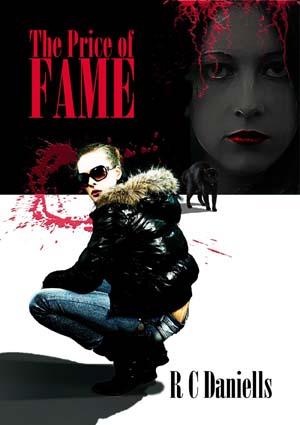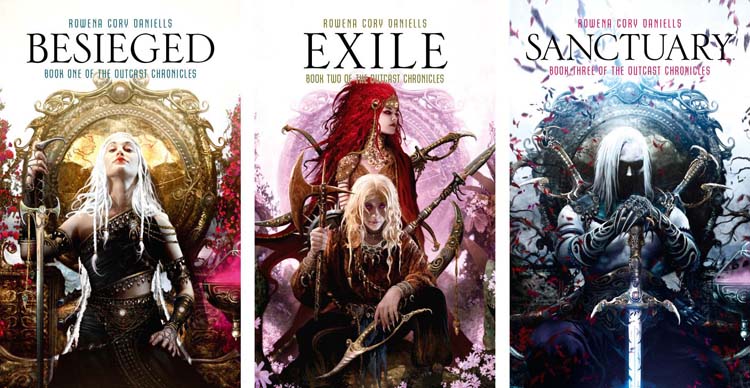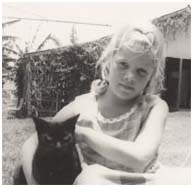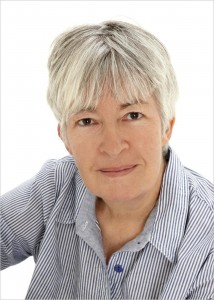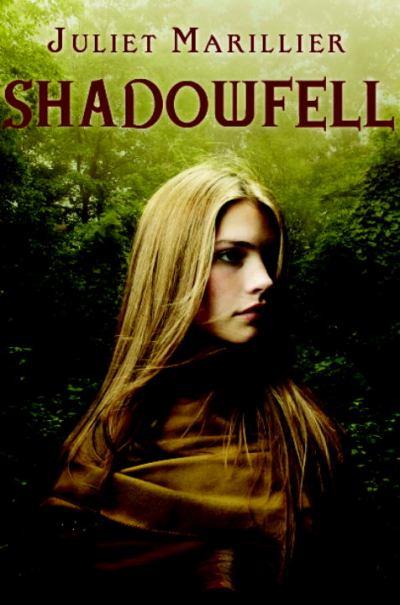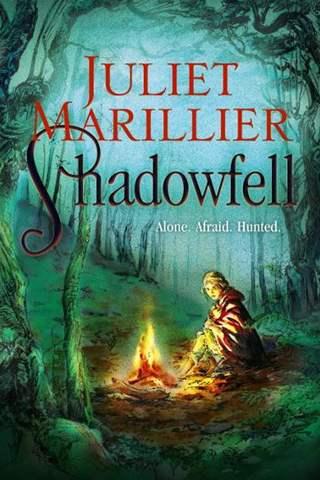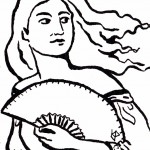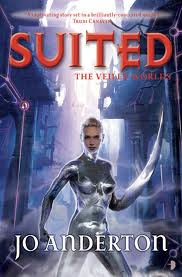I have been featuring fantastic female fantasy authors (see disclaimer) but this has morphed into interesting people in the speculative fiction world. Today I’ve invited the talented Jason Nahrung to drop by.
 Jason will be in South East Queensland for the launch of his book, Salvage, soon. In the meantime, look out for the give-away at the end of the post.
Jason will be in South East Queensland for the launch of his book, Salvage, soon. In the meantime, look out for the give-away at the end of the post.
Q: Your novella Salvage, is coming out through Twelfth Planet Press. This is set in remote Queensland and has dark undertones. How do you bring darkness to sunny QLD and why did this story come to you in novella length?
 Indeed, Salvage is available now, and I’m running some celebratory events in Queensland in August to support it (Brisbane launch. The novella was a gradually developed story – I’ve explored the slightly unusual process at my blog that came from both time and place: three writing retreats across three years, all at the same location on Bribie Island. That might’ve helped determine the length, in that I wrote about a third of the story in each retreat, and then polished it. I did wonder about expanding it into a novel-length piece – novellas aren’t the most popular format, although that does seem to be changing in line with the e-revolution – but the story is complete at this length, just under 40,000 words: why add to it unnecessarily in the pursuit of some perception of making it more marketable?
Indeed, Salvage is available now, and I’m running some celebratory events in Queensland in August to support it (Brisbane launch. The novella was a gradually developed story – I’ve explored the slightly unusual process at my blog that came from both time and place: three writing retreats across three years, all at the same location on Bribie Island. That might’ve helped determine the length, in that I wrote about a third of the story in each retreat, and then polished it. I did wonder about expanding it into a novel-length piece – novellas aren’t the most popular format, although that does seem to be changing in line with the e-revolution – but the story is complete at this length, just under 40,000 words: why add to it unnecessarily in the pursuit of some perception of making it more marketable?
One of the reasons I began to write with a view to publication was a yearning to see the kinds of stories I loved – speculative fiction of all stripes – set in my own backyard. Why did all the aliens land in the US? Why do the English and the Americans get to go off-world? It’s been most gratifying to see the likes of Trent Jamieson and Stephen M Irwin selling their Australian-set – Brisbane-set, no less – novels overseas, with no questions asked.
Queensland, for all its beach stereotypes, has plenty of darkness, as Trent and Stephen have shown: urban back streets, rural isolation, baking plains, choking forests. The beach has its own dangers, too: sunburn, rips, sharks and stingers. True, the Gothic mode that I love so much is an awkward fit: no misty moors nor crumbling castles, for instance, but I think mirage-haunted clay pans and abandoned homesteads work just as well, especially given our own colonial unease within the landscape. The Gothic is about mood, about the uneasy past and fragile emotions, and those kinds of influences can work in most settings. At the end of the day, horror is about people: they fall short in all climates.
In Salvage, the beach is an unlikely setting for a vampire story, but I think it works thanks to that very contrast. The landscape is a limiting, isolating factor; it mirrors the threat facing the characters. And the sea is a wonderful metaphor for immortality and hunger. The vampire ecology is always demanding; in Salvage, I’ve made my own changes and taken a subtle approach: the word vampire is never used, for instance.
Q: I met Jason through the Vision Writers Group and we both did our Masters through QUT. At that time Jason was writing a book about Kev, the Vampire, transplanting the vampire mythology to an Australian setting. When I told my kids the title and the concept, they wanted to read the book. Did you eventually finish the book, Jason? Or have you moved on and put it aside until you work out how you want to tackle the concept?
Ah, dear Kev. His story’s been with me for more than 10 years – a chapter, long since discarded, was the first thing I took to the Vision writers group – and has been through four distinct iterations as I’ve tried to find the right format, the right narrative, the right characters to tell the story … and finally, I’ve done it! Called Blood and Dust, the novel will be out later this year in digital format through Sydney publisher Xoum.
Q: As I recall part of your Masters was an examination of the vampire in Australian fiction. (See here for pre 2007 OZ vampire stories, and here for Oz vampire stories post 2006). I notice there are a lot more stories, post 2006. Can you give us a glimpse of what conclusions you came to with your research?
I confess I haven’t done a good job of keeping up with Aussie vampire fiction since I finished the Masters, and there is certainly a lot of it out there. The pleasing thing, for me, is that there seems to be less disinclination to set it in Australia. I suspect cultural cringe was as much an issue as narrative concerns: a lot of the early fiction was set overseas or in geographically neutral settings. Sure, we’re a sunburnt land, but we’re also highly urbanised and geographically isolated both as an island and internally as a large land mass. Writers have increasingly seized on those characteristics, looked at how our colonial past and our successive waves of migration have opened the doors to the Gothic, and how to fit those tropes into the sprawl of modern-day Australian society. A very good example of the diversity is Dead Red Heart, an anthology of Australian vampire stories published last year by Ticonderoga Publications that covers the gamut: colonial, indigenous, outback, urban, rainforest and more.

Kirstyn and Jason (courtesy Cat Sparks)
Q: Your partner, Kirstyn McDermott, is a fellow writer of dark fiction. Do you find this is a plus having a partner who is a fellow writer? Have you collaborated? Or do you find you can’t show each other work-in-progress because you feel too naked?
It’s a lot of fun having another writer in the house. We have conversations about semi-colons and exclamation marks, for instance; we discuss the structure of our stories, plot sticking points, character headaches, moral issues. We read each other’s work, usually once the first draft is finished, and offer feedback, and then will proofread as well. Plus, it’s nice to not feel guilty about spending time with the people in my head rather than my wife, knowing that she’s doing the same thing!
We haven’t collaborated yet, but it’s something we’d like to do in the future. We have different writing processes that should dovetail quite well. I tend not to show anyone my work in progress because it’s all fairly malleable; I have to write the story to know what the story is about, then go back and do a lot of rewriting to get it into shape Kirstyn lands her words on the page pretty much in final form, having spent a lot of time internalising and then shaping on the page during that first draft.
Q: The road to publication is rocky. Back in 2007 your book, The Darkness Within, was chosen by Hachette to launch a new line. Not long after this the line closed down and you were ‘orphaned’. What advice can you offer to fellow writers who find themselves in this position?
 The Darkness Within did have a rocky start: it was picked up by Lothian as part of a new series of adult horror novels, but Lothian was bought by another company, and that company was bought by Hachette, all in short order. Hachette broke The Darkness Within out of the series and upscaled it to a trade paperback, which to be honest I never think is helpful for an unknown debut trying to compete against established authors in cheaper paperback. We did get good inclusion in catalogues and wide distribution – and a gorgeous cover!
The Darkness Within did have a rocky start: it was picked up by Lothian as part of a new series of adult horror novels, but Lothian was bought by another company, and that company was bought by Hachette, all in short order. Hachette broke The Darkness Within out of the series and upscaled it to a trade paperback, which to be honest I never think is helpful for an unknown debut trying to compete against established authors in cheaper paperback. We did get good inclusion in catalogues and wide distribution – and a gorgeous cover!
I guess how you react to changes at that industry level is in part determined by how much control of your product you’ve got. I know some authors have been able to buy their books back to avoid having them dumped on the market, devoid of love or promotion, by an unsympathetic publisher looking to change direction and cut losses. Otherwise, you just have to do your damndest to promote the title, and make sure you get those rights back as soon as your contract allows so you can leverage that title in the future.
Q: I notice that The Darkness Within was sold as both horror and crime. Where do you think the divide exists, or have we reached a point where there is no divide in the genres?
I’m not sure where the crime angle came into it – it was quite weird to see it pop up on crime websites, and I imagine anyone reading it based on that presence would’ve been bitterly disappointed. Certainly, the boundaries between genres is increasingly porous – crime and horror do go together very well, and we’ve got crime blending with fantasy and science fiction; period pieces and romance adapting horror monster tropes for their own purpose; alt history using science fiction and fantasy.
The boundaries are imposed by purists and traditionalists, and to some extent by marketers trying to work out which shelf – or which meta tags – to use. The biggest divide appears to be between capital L literature, where the prose is still king, and the more narratively driven genres; between attempts to distinguish between good and bad writing, between art and commercial fiction. The fact that you find few genre authors – YA is a possible exception, its umbrella term enclosing such a wonderful diversity of genres from contemporary lit through to the wonderfully fantastic – at mainstream literary festivals illustrates that divide, I think; it’ll be interesting to see the support for GenreCon in Sydney in November, which seeks to embrace all branches of genre. Now that could be a fascinating melting pot of approaches and ideas!
I consider Salvage to be a cross-genre story: part horror/thriller, part romance, part contemporary lit. It’s made promotion a little awkward, because I don’t think it quite fits neatly into any of those categories, but draws on tropes from all of them to tell its story. There are no genre holds barred when it comes to servicing Story. If only there was a shelf for that.

Q: In 2005 you won the William Atheling JR Award for a piece you had published in the Courier-Mail, Why are Publishers Afraid of Horror? Is it possible to read this article? What did you have to say in it?
It is: the Australian Horror Writers Association has archived it at here.
The piece surveyed a number of writers about the genre’s standing in the Australian publishing landscape, and found little support for it in the mainstream, apparently still haunted by the pulp that came out in the 1980s. The trend, which is still continuing, was for stories that might’ve been categorised as horror, particularly of the non-creature variety, to be brought out as general literature. The horror title was eschewed because of its slasher and pulp overtones; dark fantasy was on the rise as a more palatable alternative, but even that had its limitations.
It’s worth pointing out that print on demand and digital publishing, both in e-book and online format, have helped change the landscape since the article was published; there are a bunch of small press concerns happy to fly the horror flag.
Q: You are currently editing the QWC newsletter. What fiction are you working on?
Last year was a bumper year for me in terms of short fiction, but that has dried up this year. I think that’s a function of managing paid employment, lifestyle and creative thinking space. I’m concentrating on a sequel to Blood and Dust: I’ve spent the past three months trying to imagine the story, and actually do some plotting, and now it’s time to start writing my way into the story. Exciting, frustrating times!
Q: I hear you’re flying up from Melbourne for a tour of South east Queensland. If librarians and writing groups would like to contact you for a talk, what do they do?
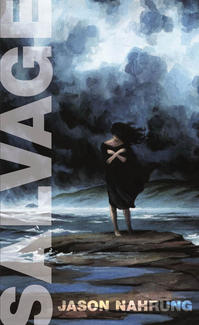 I’m looking forward to returning to my home state with Salvage — the story was written on Bribie Island, after all! I’m launching the book at Avid Reader on August 10 with the wonderful Kim Wilkins doing the honours. The next day, I’m joining my fellow writers from the dark side Kirstyn McDermott and Angela Slatter to discuss horror and dark fiction at the Logan North library as part of their excellent SF Month line-up. And then on Monday August 13 I’m presenting a talk about Salvage, vampires and writing — all that good stuff! — at Caloundra library, then backing up at the Noosa library on the 14th. The support from the libraries has been awesome. Full details on when, where and how to RSVP are at my website, and my contact details are there, too.
I’m looking forward to returning to my home state with Salvage — the story was written on Bribie Island, after all! I’m launching the book at Avid Reader on August 10 with the wonderful Kim Wilkins doing the honours. The next day, I’m joining my fellow writers from the dark side Kirstyn McDermott and Angela Slatter to discuss horror and dark fiction at the Logan North library as part of their excellent SF Month line-up. And then on Monday August 13 I’m presenting a talk about Salvage, vampires and writing — all that good stuff! — at Caloundra library, then backing up at the Noosa library on the 14th. The support from the libraries has been awesome. Full details on when, where and how to RSVP are at my website, and my contact details are there, too.
Q: I was prompted to start this series of interviews because there seems to be a perception in the US and the UK that fantasy is a bit of a boy’s club. Do you think there’s a difference in the way males and females write fantasy?
I don’t think that perception holds much currency in Australia, which is what has made your series so interesting to follow. And fantasy is such a massive label, isn’t it? I don’t think I can say I’ve noticed a peculiar gender approach in what I’ve been reading; admittedly, I’ve been reading a lot of fiction by women, due in part to the Australian Women Writers Challenge. One thing that irritates me in any story is the presentation of women as some kind of cookie cutout: the trophy, the sack of raw emotions, the sex object, etc; I think that’s mostly a boy thing because the trope is easier than providing a well-rounded character.
Q: Following on from that, does the gender of the writer change your expectations when you pick up their book?
It doesn’t; the combination of cover art and back cover blurb set my expectations. The only gender expectation I’ve noticed is that, in a first person account, the narrator has the same sex as the author until proven otherwise. I don’t know why that bias occurs, but it’s caught me out a few times.
Q: And here’s the fun question. If you could book a trip on a time machine, where and when would you go, and why?
Manchester, 1979. To see Joy Division in full flight.
Jason has a copy of his new novella Salvage to give-away.
Giveaway Question: What is your favourite vampire character in a movie or book?
Catch up with Jason on Facebook
Catch up with Jason on Goodreads
Follow Jason on Twitter @JNahrung
Catch up with Jason on his blog
See here for a list of Jason’s books and short stories


